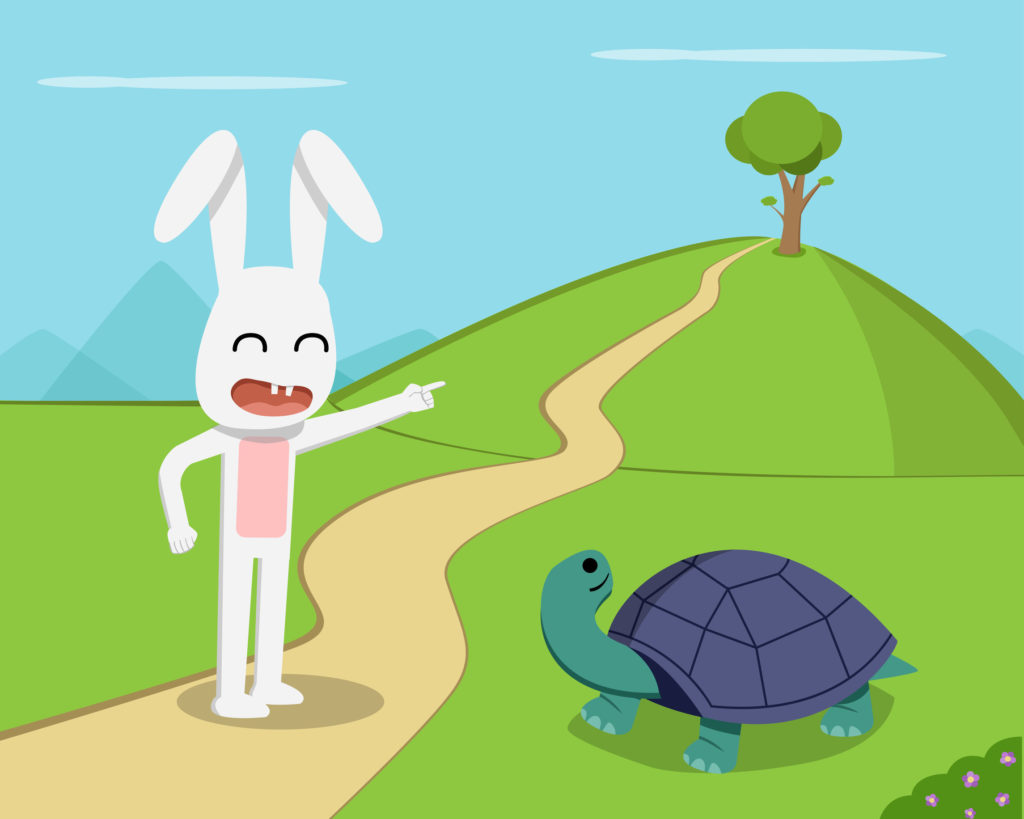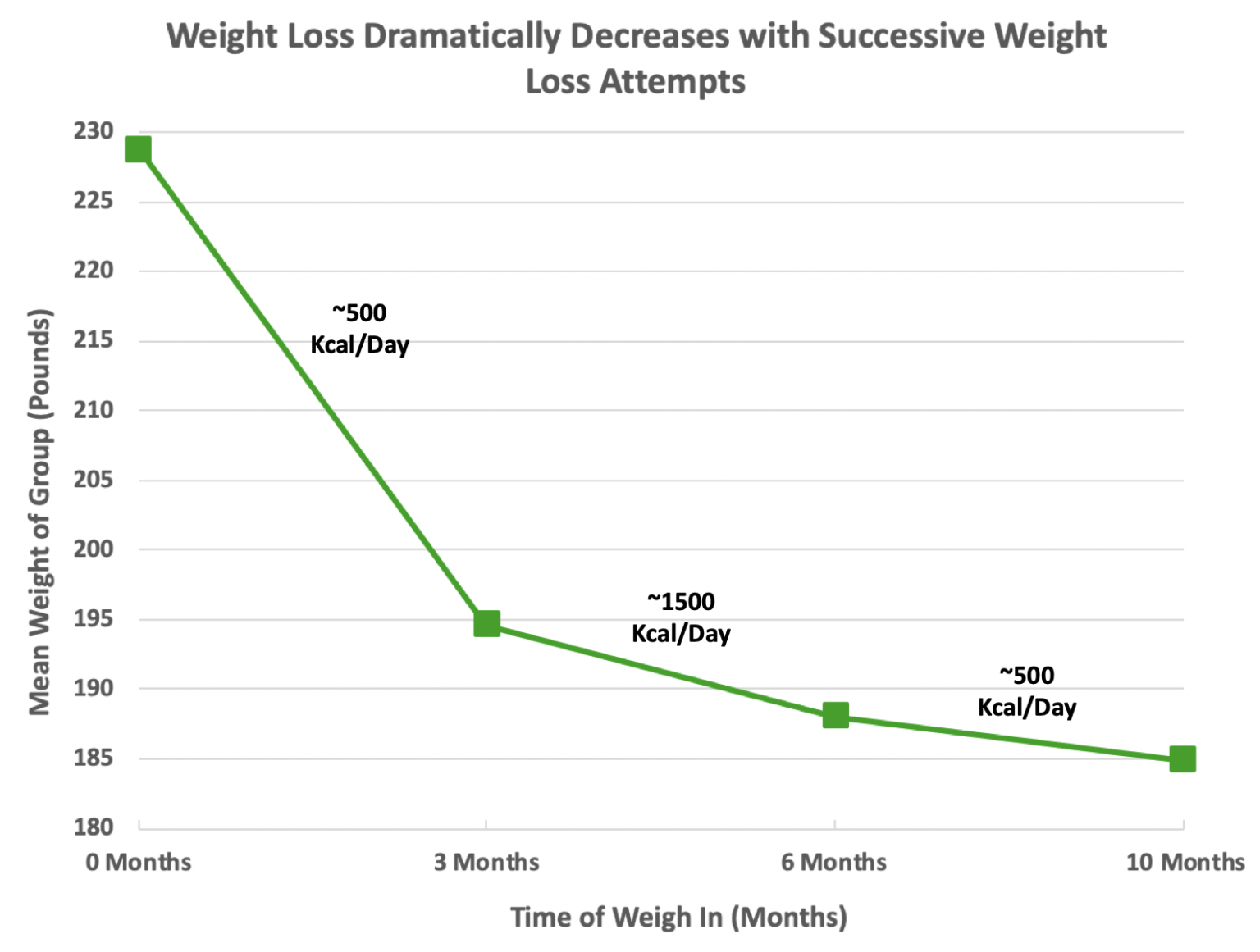Is It Better to Lose Weight Fast or Slow?

Conventional wisdom for losing weight and keeping it off has been to lose weight gradually over time (slow and steady wins the race). The thought was that if you lost weight rapidly, that you would ruin your metabolism and consequently gain all of the weight back. It turns out this type of thinking couldn’t be further from the truth. In fact, the opposite may be true (Figure 1).
In a study by Unick et al., 2015 (Figure 1), weight loss participants were instructed to consume 1200 – 1800 calories/day. All of the people in the research study were placed under the same conditions and given the same instructions – that is they all tried to lose as much weight as they could. Yet, some people lost more weight than others on the same diet and exercise program. In a post hoc analysis (after the research was done), the researchers grouped individuals into those that lost < 3%, 3-6% or >6% of their initial body weight over the first two months on diet and then began following them for the next 8 years (graphed in Figure 1).
Figure 1. The Amount of Weight Lost on a Diet within the First Two Months Predicts Weight Loss for Years to Come. Weight loss participants were instructed to consume 1200 – 1800 calories/day with two meals and one snack coming from meal replacements for the first six months of their diet. From 7 – 12 months participants replaced one meal and one snack with a meal replacement, while eating “real food” for their other meals and snacks. Each data point from 0 to 12 months represents one month (a monthly weigh in); thereafter each data point represents one weigh in (yearly weigh in). All participants were encouraged to increase their physical activity to at least 175 minutes/week by 6 months and attended weekly behavior change meetings months 0 – 6 and three meetings/month for months 7 – 12. Data adapted from Unick, JL 2015; OBESITY.
The individuals who lost the most amount of weight during the first two months of their new diet (gold line; > 6% of initial body weight lost), ended up losing significantly more weight over the coming months and even years. Individuals who lost less than 3% of their initial body mass during the first two months (blue line; < 3% of initial body weight lost) could be considered “slow and steady/gradual weight losers” whereas those who lost greater than 6% of their body mass in the first two months (gold line) would traditionally be considered rapid weight losers. As you can see if figure 1, if you want to maximize the amount of weight you lose, you better lose as much weight as you can during the first six months of your diet.
Study after study after study shows this same effect: the amount of weight you lose and keep off is dependent upon how much weight you lose in the first 0 – 6 months, with the first two months probably being the most important. After six months, most people will begin gaining some of their weight back. Slow and steady does not win the race.
Why You Gain Weight Back after Six Months
So why do you start gaining weight back after six months? While there are tens and hundreds of reasons, the greatest of them is dietary adherence. When you first start a weight loss program, you are highly motivated and losing weight is at the top of your priority list. But as time goes on, the weight loss program is less novel, becomes stale, less of a priority, and you will begin to slide back into old habits, whether this is a conscious or unconscious decision. That’s just human nature. You can’t expect to keep up that type of laser focus forever, irrespective of what you are trying to accomplish. You’re going to need a break. That’s one of the reasons The Science of Dieting recommends:
- Controlling Your Food Environment by following the Steps in How to Create a Weight Loss Diet You Can Stick To
- Dieting as Hard as You can for up to 6 Months Before Taking a Break
It sounds overly simplistic but if the food isn’t available to you, you can’t eat it. This is why it is important to control your access to ultra-processed, highly palatable, high-calorie food. Think about the places you eat. They probably involve work, home, eating out, and potentially school. To the best of your abilities and level of control, creating a food environment that eliminates or at least limits the number of opportunities to eat ultra-processed, highly palatable, high-calorie food (temptations) will help you keep your number of daily calories down.
There are a couple of reasons we also recommend dieting as hard as you can for the first 0-6 months of a weight loss program before taking an extended break. It is extremely challenging to consume a low calorie (800 – 1200) or very low calorie (< 800) diet for more than a few months due to the severity of their restriction. Most adults, depending on body size and activity level will require between 1800 – 3000 calories/day, so you can see that this is quite a restriction. After a month or two of eating meal replacements and tv dinners, the staleness of your diet, your hunger, and your biology will drive you to want to eat more calories and real food.
But What if You Haven’t Lost All the Weight You Wanted to Lose?
The temptation is to try to struggle through the hunger and continue attempting to eat a low calorie diet. What tends to happen is that you a) aren’t very good at keeping your calories low and b) you are miserable from having to eat so few calories and the same types of foods over and over and over again. So not only are you not losing weight but you’re also miserable attempting to do so. This double negative is not good for your mind or your body.
The other temptation is to take a short break and then go back on the low calorie or very low calorie diet. But this doesn’t seem to be a great strategy as the amount of weight you will lose on your second low calorie attempt will not nearly be as much as you lost on your first attempt (Figure 2).
Figure 2. Weight Loss Dramatically Decreases with Successive Weight Loss Attempts. Participants consumed 500 calories/day for 0 – 3 months, 1500 calories/day for 3 – 6 months, and 500 calories/day for 6 – 10 months. Data adapted from Smith & Wing, 1991; HEALTH PYSCHOL.
In a classic study by Smith & Wing, 1991 research participants were asked to consume 500 calories/day for 3 months. Knowing that it is extremely difficult to stay on such a restrictive diet (and the fact that people still need to lose more weight), the researchers gave the dieters a “break” for 3 months by allowing them to consume roughly 1500 calories/day before reinitiating a 500 calorie/day diet for months 6 – 10. As you can see in figure 2, despite eating only 500 calories/day, the research participants lost nearly no weight during their second very low-calorie diet attempt (VLCD 2). They underwent a whole lot of pain for essentially no gain.
Although there are thousands of factors that go into losing or gaining weight, you can broadly categorize these factors into physiological or behavioral categories. Physiological factors are those biological factors within your body (i.e. your metabolism) whereas behavioral factors are the decisions that you as a free living human choose to make. While you can argue that you can’t separate physiology and behavior because what happens in your body (your physiology) “controls” your behavior, I think it is important to separate the two. Without this distinction, you are going to feel like you have no control, like you’re just doing whatever your body tells you to do. But this isn’t the case, we’re humans with free will, capable of overriding these systems and controlling our impulses. We’re not machines or toddlers.
In their study, Smith & Wing, concluded that there was “markedly poorer behavioral compliance during VLCD 2. Attendance, frequency of self-monitoring, and percentage weeks in ketosis were substantially lower during VLCD 2.” They go on to say that ….“the contribution of behavioral factors to a reduced rate of weight loss may be of greater magnitude than the contribution of physiological adaptations.”
And in general, most research supports this conclusion, that yes, physiology can and does change in individuals, but that behavioral factors may play a more significant role on weight loss or weight gain than biology per se.
So what is the bottom line, should you try to lose weight fast or slow? To me the answer is FAST! Not only do individuals who lose the most weight in the first two months of a weight loss program lose more weight in 3, 4, 5, and 6 months, but they keep more weight off longer. Losing weight via “the gradual method” allows you to be more lackadaisical and cheat/slide more than you should. Our recommendation is to lose as much weight as you can in the first 2-3 months on a diet and then try to maintain that weight loss for a number of months before attempting another 2–3-month weight loss bout. And this isn’t because of physiological factors, this is because it is just so damn hard to keep your calories so low for so long. The important thing is going to be
How You Transitions Into- and Out of Your Low-Calorie Bouts?
I mean what good is losing a bunch of weight and gaining it all back? Now you’re a yo-yo dieter again. It is impossible for me to fully address how to transition in and out of diet phases here, but I have some reading/resources that I think can help you — I think it is of utmost importance that you follow The 5 Universal Truths of Weight Loss, know that Small Changes to Your Diet will Yield Small Results, Know the Difference Between Meals, Snacks, and Indulgences, Effectively Deal with Dietary Transitions, and learn How to Create a Weight Loss Diet You Can Stick To.
Losing weight and keeping it off isn’t easy. You can’t just set it and forget it. Once you lose the weight, you’re not done. Now you need to fight to keep it off. You’re going to need to do a lot of upfront work before you even start the diet, relentlessly execute the diet, be vigilant during the diet, and manage your transitions into and out of diet phases well.
I know this sounds like a ridiculous amount of stuff for your busy life. But it is worth it! It’s hard to put a price on feeling good. And like most things, the more you practice it, the better you get at it. The goal is to automate, systemize, and streamline as much of the eating process as possible. If you’d like some help with getting started, shoot me a line. I’m literally dying to help you!
Is it better to lose weight fast or slow? The answer is most definitely FAST!







Responses